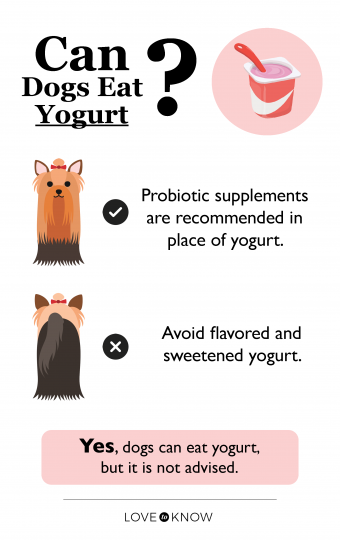
Yes, dogs can eat yogurt, but this does not imply that they should. While yogurt is not toxic to dogs, it does contain lactose, which means that many dogs will have a hard time digesting it.

The Benefits of Yogurt for Dogs
Calcium and protein are abundant in yogurt. It can also serve as a probiotic, which is beneficial to your dog's digestive system. If you're going to feed your dog yogurt, make sure it's plain and free of any artificial or natural sweeteners. Added sugars are bad for dogs and humans alike, and some artificial sweeteners, such as xylitol, are toxic to dogs.
You should also search for yogurt that contains a lot of active cultures, such as plain Greek-style yogurt. This yogurt is superior to conventional yogurt because it contains less lactose.
Probiotics Have Beneficial Properties
Including probiotics in your dog's diet can help them maintain a healthy immune system. Probiotics help your dog's gastrointestinal health by encouraging the growth of beneficial bacteria in the gut. Probiotics can also help your dog's immune system and overall wellness because their digestive system contains roughly 80 to 90 percent of their immune system.

What to Avoid
Dogs' bodies are not built to process lactose. Thus, a high-lactose meal might cause flatulence, diarrhea, and vomiting. If your dog exhibits any of these symptoms, make an appointment with your veterinarian. Dog owners must be mindful about the fat content, as with any dairy product. When a dog consumes too much fat in their diet, they may experience stomach discomfort or even pancreatitis, a dangerous and sometimes fatal condition.
Yogurt containing xylitol, a prevalent sweetener in human meals, should never be given to dogs. Because xylitol accumulates in the liver tissue, even a modest amount of xylitol-sweetened yogurt is hazardous to dogs and can lead to liver failure. Avoid yogurt with fruit flavors or any type of "mix-ins," as they often contain extra sugar in the form of syrups and may also contain artificial sweeteners.
How Much Yogurt Can Dogs Have?
The proper serving amount for dogs varies according to the type of yogurt and the size of your dog, among other factors, including:
- Weight
- Daily caloric intake
- Any underlying health issues
- Activity level
You can figure out how much yogurt your dog can eat after you know their daily nutritional requirements. The 10 percent treat rule should be used to determine how much yogurt you serve your dog. Yogurt should account for no more than 10 percent of your dog's daily calorie intake.
Probiotics in a Different Form
Although yogurt contains beneficial properties, it isn't the best source of probiotics for your dog and can cause gastrointestinal discomfort. While yogurt may not be the best option, that doesn't imply probiotics in general aren't. There are other options that are generally risk-free. The safest way to give your dog a probiotic boost is to offer them a probiotic supplement.

Choose a soil-based probiotic over standard probiotics like Lactobacillus, Bifidobacterium, and other more fragile probiotic species for a daily probiotic. They might not be able to withstand the acids in your dog's stomach.
Probiotics that are grown in the soil are more resilient. They have a protective shell that aids in their survival as they pass through your dog's digestive tract on their way to the colon. They also have a considerably stronger punch. If you can't find a soil-based probiotic, look for a supplement that has at least 20 billion CFUs (colony-forming units) and has more than one type of bacteria.
Choosing a Probiotic Supplement Over Yogurt
Even as a treat, yogurt isn't a good source of probiotics for dogs. So, the next time you consider using yogurt to assist your dog's health, think twice. Instead, go for a probiotic supplement that will maintain and improve their gut health.







